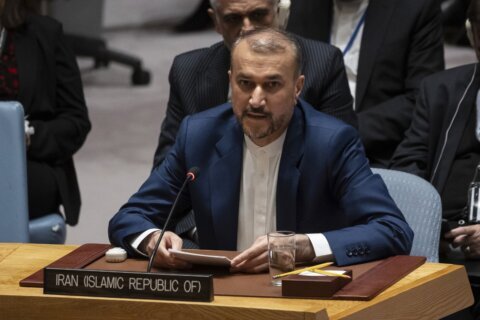IRBIL, Iraq (AP) — The bodies of 16 Iraqi Kurdish migrants who drowned last month as they attempted to cross the English Channel were repatriated to northern Iraq on Sunday.
The Nov. 24 disaster, in which 27 migrants died, has been described as the worst on record involving migrants trying to cross the perilous passage to Britain from France. The boat capsized off the coast of northern France, sparking a political crisis. Britain and France accused each other of not doing enough to deter people from crossing the English Channel.
Dozens of mourners waited at the semi-autonomous Kurdish region’s international airport in Irbil Sunday, where the plane carrying the bodies arrived. Relatives grieved as the caskets were transported by ambulance to their hometowns for burial.
The repatriations came amid a new tragedy involving migrants from the Middle East searching for new lives in Europe. Libya’s Red Crescent said Sunday that at least 27 bodies of Europe-bound migrants, including a baby and two women, have washed ashore in the country’s west.
A disproportionate number of migrants from the Middle East attempting to reach Europe lately have been people from Iraq’s Kurdish region. Although northern Iraq is more prosperous than the rest of the conflict-scarred country, growing unemployment and frustration over corruption is forcing many to consider the risky journey.
Among the bodies returned Sunday was that of 24-year-old Maryam Nouri, called Baran by her friends and family. She perished during the ill-fated, illicit voyage across the English Channel with hopes of reuniting with her fiancé in Britain. The flimsy boat sank a few miles (kilometers) from the French coast. At least 27 migrants bound for Britain drowned. France’s interior minister called it the biggest migration tragedy involving the crossing to date.
Other bodies included those of Shakar Ali, Sarkawt Pirot and Avrasiya Ahmad, who came from the Ranya district of the Sulaymaniyah governorate in the Kurdish-run region of Iraq.
Hundreds of family members and friends attended a ceremony in the town to pay their last respects.
Relatives said the three had tried to make it to a better life in Europe as they had been unable to find employment in Iraq.
Shakar Ali “graduated from the oil department in geology college, which is a much needed department for this country. But unfortunately, after many attempts – and we even paid money to people to get him a job, but he couldn’t get one,” said his brother, Haval Ali.
“Many of his colleagues, those with connections, got jobs, except my brother… so he decided to migrate abroad.”
Copyright © 2024 The Associated Press. All rights reserved. This material may not be published, broadcast, written or redistributed.







